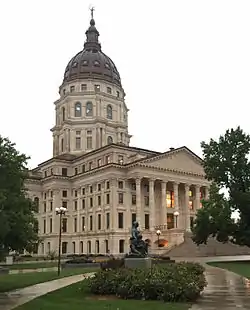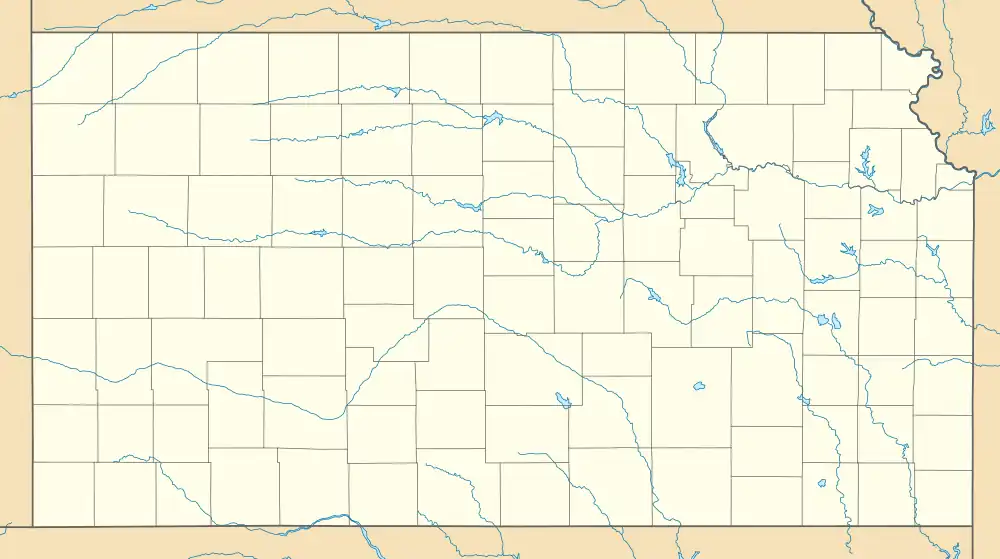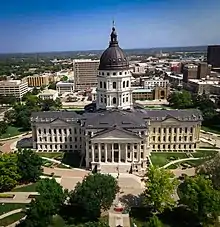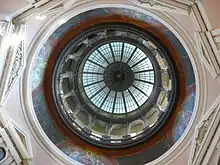Kansas State Capitol | |
 The Statehouse, in 2015 | |
  | |
| Location | SW 8th & SW Van Buren, Topeka, Kansas |
|---|---|
| Coordinates | 39°2′53″N 95°40′41″W / 39.04806°N 95.67806°W |
| Area | 20 acres (8.1 ha) |
| Built | 1866–1903 |
| Architect | E. Townsend Mix |
| Architectural style | French Renaissance |
| NRHP reference No. | 71000330[1] |
| Added to NRHP | September 3, 1971 |

The Kansas State Capitol, known also as the Kansas Statehouse, is the building housing the executive and legislative branches of government for the U.S. state of Kansas. Located in the city of Topeka, which has served as the capital of Kansas since the territory became a state in 1861, the building is the second to serve as the Kansas Capitol.[2] During the territorial period (1854–1861), an earlier capitol building was begun but not completed in Lecompton, Kansas, and smaller structures in Lecompton and Topeka were where the territorial legislatures met (see Capitols of Kansas).
The dome, at 304 ft (93 m), is taller than the 288 ft (88 m) United States Capitol dome, although its diameter (50 ft (15 m)) is approximately half that of the national capitol (96 ft (29 m)). It is one of the few capitols in the United States that continues to offer tours that go to the top of the dome.[3] Visitors enter the dome by climbing 296 steps leading from the fifth floor to the top.[4]
History
19th century
The land for Capitol Square was donated by Cyrus K. Holliday via his Topeka Town Company in 1862. The master architect was Edward Townsend Mix with the wings designed by John G. Haskell.[5] Construction on the East Wing began in 1866, using "native" limestone from Geary County, Kansas. Construction began on the West Wing in 1879 using limestone from Cottonwood Falls, Kansas and in 1881, the legislature authorized and appropriated funds for the construction of a central building to link the two wings. Construction of this central building began in 1886, and the contract for dome construction was let in May, 1889.[6]
20th century

The building was declared officially complete in 1903, after 37 years of construction.[2]
It was not until 1988 that a design for a sculpture to stand atop the dome was finally approved. Ad Astra, a 22+2⁄12-foot (6.756 m) bronze sculpture weighing 4,420 pounds (2,000 kg), was installed atop the dome on October 10, 2002.[7] The sculpture, by Richard Bergen,[8] depicts a Kansa Native American with bow and arrow pointed at the North Star and was chosen from 27 entries to adorn the dome.[9] The title Ad Astra is Latin shortening of the state motto Ad Astra Per Aspera To the stars through difficulty.
21st century

The building was featured prominently on Kansas license plates issued from January 2001 until April 2007.
In December 2001, the Statehouse began a $120 million (~$190 million in 2022) modernization project, led by Treanor Architects; the project included restoration of its first through fifth floors, the rehabilitation and expansion of its basement, restoration of its exterior masonry and copper roof/dome.[10] By the time the project finished in spring 2014, scope creep and delays resulted in a total cost of $332 million (~$406 million in 2022), covering "new heating and cooling systems, greater security and restroom accessibility, a new parking garage, visitor center, underground office space and replacing the roof and dome."[10]
Frescos and murals
In 1898, Jerome Fedeli painted frescos near the top of the dome in the rotunda. Fedeli's work depicted bare-breasted classical women. However officials referred to the paintings as "Nude Telephone Girls" and had them painted-over.[11]
_and_U.S._Secretary_of_Education_--Arne_Duncan_observe_a_mural_at_the_Kansas_State_Capitol_in_2012.jpg.webp)
In the 1930s, John Steuart Curry painted murals on the second floor including the building's most famous painting—Tragic Prelude—which depicts an oversize and raging John Brown wedged between the warring sides of the American Civil War, flanked by flames and a tornado. Curry's work gained considerable notoriety for depicting unsavory aspects of Kansas history and he left them unsigned and did not complete a commission to paint murals in the rotunda. Curry's depiction of Brown is believed to be the only instance of a person convicted of treason being featured in a state capitol.
David Hicks Overmyer painted a series of murals in the first floor rotunda between 1951 and 1953 entitled The Coming of the Spaniards, The Battle of Arickaree, The Battle of Mine Creek, Building a Sod House, Lewis and Clark in Kansas, Westward Ho, Arrival of the Railroad, and Chisholm Trail. [12][13]
From 1976 to 1978, Lumen Martin Winter painted the murals in the rotunda.
See also
References
- ↑ "National Register Information System". National Register of Historic Places. National Park Service. November 2, 2013.
- 1 2 "Kansas State Capitol - Timeline". Kansas State Historical Society. April 2011. Archived from the original on 2015-12-21. Retrieved 2011-06-15.
- ↑ "Kansas State Capitol Building". KansasPhotoTour.com. Retrieved 2009-04-06.
- ↑ "Kansas State Capitol online tour". Kansas State Historical Society. Retrieved 2009-04-06.
- ↑ "Kansas State Capitol - About". Kansas State Historical Society. Retrieved 2011-06-15.
- ↑ "Kansas Statehouse General Information". Kansas Department of Administration. 11 June 2007. Retrieved 2010-06-26.
- ↑ "Kansas State Capitol - Ad Astra". Kansas State Historical Society. June 2011. Retrieved 2011-06-15.
- ↑ Grenz, Chris (4 November 2002). "Tribes participate in statue dedication". Topeka Capital-Journal. cjonline.com. Retrieved 2011-06-15.
- ↑ Moline, Matt (16 November 2002). "Capitol dome contenders—Runner-up: The grounded 'Ad Astra'". Topeka Capital-Journal. cjonline.com. Archived from the original on 7 October 2012. Retrieved 2011-06-15.
- 1 2 Hughes, Elliot (November 14, 2013). "$332 million later, Statehouse construction nears its end". Lawrence Journal-World. The World Company. Retrieved 2013-11-15.
Perhaps it is hard to believe, but the end of the construction at the Kansas Statehouse—about 12 years' worth—is nigh. Construction is expected to be nonexistent inside the building by the new year, when work on the roof and visitor center should be wrapped up. Meanwhile, miscellaneous exterior work is expected to be finished in the spring, according to Statehouse Architect Barry Greis.
- ↑ "Cool Things - Artist's Brushes and Palette". Kansas State Historical Society. Retrieved 2011-06-15.
- ↑ Susan V. Craig, ‘’Biographical Dictionary of Kansas Artists (active before 1945)‘’ (Lawrence: University of Kansas, 2009), p. 276 (https://kuscholarworks.ku.edu/bitstream/handle/1808/1028/BDKAversion2.pdf?sequence=4) Accessed January 5, 2022.
- ↑ “David Hicks Overmyer,” Kansapedia, Kansas State Historical Society, 2020, (https://www.kshs.org/kansapedia/david-hicks-overmyer/15551) Accessed January 5, 2022.
External links
- Kansas State Capitol - Kansas Historical Society
- Historic Guided Tour of Capitol
- Photo Gallery of Kansas Statehouse construction wrapping up, from Lawrence Journal-World
- Copper From Statehouse Dome Becomes Art on YouTube, from Hatteberg's People on KAKE TV news
- Publications concerning the Kansas State Capitol building available via the KGI Online Library